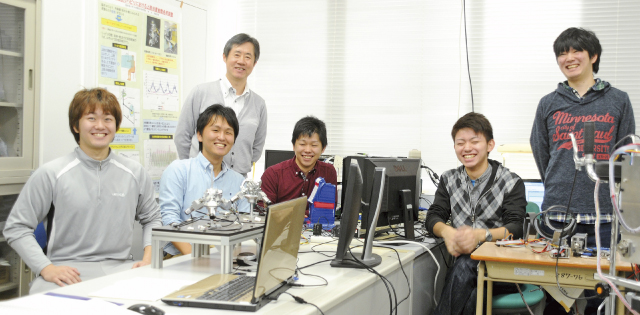
Interdisciplinary Department of Science and Engineering
The Interdisciplinary Department of Science and Engineering has established two education courses aligned with the qualities required of future professionals, rather than being divided by conventional specialized fields. This reorganization addresses the changes in required skills brought about by shifts in social structure and the advancement of globalization.
One course, the Science and Engineering Course, aims to cultivate researchers and engineers who possess comprehensive knowledge and ethical judgment, and who can play active roles across a wide range of science and engineering fields. It also seeks to nurture research and development engineers (highly specialized professionals) who acquire solid knowledge of natural sciences, strong problem-solving abilities, flexible conceptual thinking, and a broad perspective, contributing to innovation across industries related to various specialized fields. This course inherits the curricula of the former specialized fields and promotes education and research in collaboration with the Graduate School of Medical and Dental Sciences and the United Graduate School of Agricultural Sciences. Furthermore, it organizes fields where the Graduate School of Science and Engineering has particular research strengths, aiming to further advance these fields.
The other course, the Informatics Course, focuses on fostering researchers and engineers active in interdisciplinary areas integrating information science and other fields. It is structured around three fields: Mathematics and Informatics, Biological Cognitive Informatics, and Collaborative Informatics. The course also aims to further develop these areas.
Science and Engineering Course
Interdisciplinary Field
Kagoshima University Graduate School of Medical and Dental Science, and the United Graduate School of Agriculture are endowed with a unique characteristic; with this new collaboration, conventional knowledge and ways of thinking have not yet been established. Therefore it will be possible to take multiple viewpoints and develop progressive ways to solve research issues with the aim of training innovative professionals.

Material Science and Production Engineering
Our aim is to undertake fundamental, integrated research and education to examine materials production sciences, from the production of material through to the fabrication process of industrial manufacturing. Building on a background of broad foundational knowledge, our research must involve developing a symbiotic relationship with the environment. Researchers need an understanding of the careful use of energy and the flexibility to respond to changes in the diversification and complexity of industrial activity, taking into account its impact on the natural environment.

Life and Environmental Sciences
We aim to train professionals not only to acquire leading expertise in their specific field but also to build on the relevant foundational knowledge to be able to find the convergence between various areas of research in order to deepen the understanding of the various functions of life, its structures and fluctuations, the Earth and space (nature) which supports life, and the symbiotic relationship between the environment and the life it contains. Our students are also encouraged to personally participate in circulating their research within the international community.

Energy and the Environment
Our target is all things connected to human life and ecosystems, from micro-chemical environments, to the built world of human-scale architecture, to the mezzo-scale marine environment. In order to understand the needs of society from a global perspective, students will engage in work that combines various fields of study in order to acquire leading-edge knowledge. Our aim is to train professionals who have the creative skill to design and implement plans for a sustainable society.

Regional Value Creation and Safety Engineering
It is through the sustainability and conservation of the natural environment, we are able to create safe, worry-free living spaces that are accessible to all. At the regional level we must face complex, diverse changes occurring to industrial activity, and the natural environment. By polishing their skills in research and education, our students can flexibly apply fundamental, comprehensive knowledge to create tangible solutions to the threats we face in our world.

Advanced Material Science
We expect our graduates to become professionals who can bring about innovation in manufacturing. To this end, our students develop a deep knowledge of the fundamental physical properties and structure of materials, as well as the ability to conduct functional assessments, functional instrumentation analysis, predictive simulations of changes in function and traits, and gain an understanding of manufacturing processes, systems control, nanostructure control, function and trait expression mechanisms, and resource recovery.

Astronomy and Space
Building on a background of extensive foundational knowledge in astronomy, space science, Earth science and/or space engineering, and with the careful observation of astronomical objects, space, and Earth as our aim, we are engaged in the development of equipment and data processing systems. In addition, from development to application of equipment and systems, we employ practical observations in understanding the universe. We aim to train professionals who can make original, high quality contributions to research and development in this interdisciplinary field.
Informatics Course
Mathematics and Informatics
This field cultivates individuals who possess an extensive foundation in advanced mathematics and information science, and who can develop internationally recognized, original, and advanced research by creating new theories and methodologies that contribute to the advancement of mathematics and informatics, and their applied domains.

Biological Cognitive Informatics
By promoting the advanced integration of cognitive science and information science, this field aims to generate innovative technologies that solve problems in related domains, including medical and public health engineering. Our student are expected to conduct original and advanced research that contributes to the advancement of biological cognitive informatics and related interdisciplinary fields.

Collaborative Informatics
This field nurtures individuals who can apply advanced and wide-ranging information science technologies not only to the fields of science and engineering, but also to diverse areas including agriculture, medical and dental sciences, and the humanities and social sciences. With a global and multifaceted perspective, and through creative, flexible thinking and ethical judgment, our students are expected to carry out internationally recognized, original, and advanced research and development that contributes to real-world implementation.
